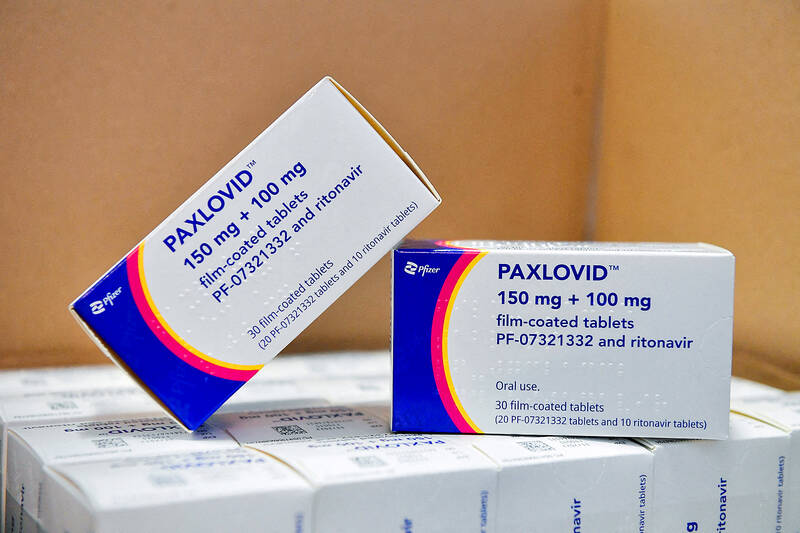The Central Epidemic Command Center (CECC) yesterday added asthma to its list of severe COVID-19 risk factors, saying that people with the condition can be prescribed oral antiviral drugs. It also designated Evusheld as a second-line medication for the disease.
The CECC in a notice to healthcare providers said that asthma has been included as a risk factor for severe COVID-19, adding that doctors can prescribe oral antiviral drugs to people with asthma who are diagnosed with COVID-19, effective immediately.
Centers for Disease Control Deputy Director-General Philip Lo (羅一鈞), deputy head of the CECC’s medical response division, said the decision was made by the CECC’s specialists’ panel after the US Centers for Disease Control and Prevention’s latest systematic review determined that asthma is associated with higher risk of developing severe COVID-19.

Photo, Reuters
The CECC in its notice also told healthcare providers that Evusheld, a monoclonal antibody, can be used as a second-line medication for COVID-19.
Lo said that Evusheld — a combination of two medications, tixagevimab and cilgavimab — offered pre-exposure prophylaxis for prevention of COVID-19 for people who are vulnerable to the virus, but cannot get vaccinated.
However, based on recent studies, the Food and Drug Administration has also approved it as a second-line treatment for COVID-19, Lo said.
Paxlovid, an oral antiviral agent, and remdesivir injections are first-line medications to treat people with the virus who have at least one of the 14 risk factors for severe COVID-19, he said.
However, if a patient’s health is not suitable for receiving the two drugs, Evusheld can be prescribed, he added.
Evusheld is less effective against some new SARS-CoV-2 subvariants, including Omicron BQ.1, BF.7, XBB and BA.4.6, but is still effective against the Omicron BA.1, BA.2, BA.5, BA.5 and BA.2.75 subvariants, Lo said, adding that the former are not yet known to be circulating in Taiwan.
The CECC yesterday reported 17,230 new local COVID-19 cases, 49 imported cases and 21 deaths from the disease.
The local caseload is 5 percent lower from Tuesday last week and most of the cases were concentrated in the six special municipalities, CECC data showed.
Of the 21 deaths, 20 people had underlying medical conditions, 14 had not received a booster dose and 14 were 80 or older.
Among the 13,421 deaths this year, 91 percent had underlying medical conditions, 91 percent were 60 or older and 66 percent had not received a booster shot, the CECC said.
As of Monday, the nation’s first and second-dose vaccination rates were 94 percent and 88.6 percent respectively, and the first and second booster vaccination rates were 74.2 percent and 17.4 percent respectively.

Taiwan is to receive the first batch of Lockheed Martin F-16 Block 70 jets from the US late this month, a defense official said yesterday, after a year-long delay due to a logjam in US arms deliveries. Completing the NT$247.2 billion (US$7.69 billion) arms deal for 66 jets would make Taiwan the third nation in the world to receive factory-fresh advanced fighter jets of the same make and model, following Bahrain and Slovakia, the official said on condition of anonymity. F-16 Block 70/72 are newly manufactured F-16 jets built by Lockheed Martin to the standards of the F-16V upgrade package. Republic of China

Taiwan-Japan Travel Passes are available for use on public transit networks in the two countries, Taoyuan Metro Corp said yesterday, adding that discounts of up to 7 percent are available. Taoyuan Metro, the Taipei MRT and Japan’s Keisei Electric Railway teamed up to develop the pass. Taoyuan Metro operates the Taiwan Taoyuan International Airport MRT Line, while Keisei Electric Railway offers express services between Tokyo’s Narita Airport, and the Keisei Ueno and Nippori stations in the Japanese capital, as well as between Narita and Haneda airports. The basic package comprises one one-way ticket on the Taoyuan MRT Line and one Skyliner ticket on

Starlux Airlines, Taiwan’s newest international carrier, has announced it would apply to join the Oneworld global airline alliance before the end of next year. In an investor conference on Monday, Starlux Airlines chief executive officer Glenn Chai (翟健華) said joining the alliance would help it access Taiwan. Chai said that if accepted, Starlux would work with other airlines in the alliance on flight schedules, passenger transits and frequent flyer programs. The Oneworld alliance has 13 members, including American Airlines, British Airways, Cathay Pacific and Qantas, and serves more than 900 destinations in 170 territories. Joining Oneworld would also help boost

A new tropical storm formed late yesterday near Guam and is to approach closest to Taiwan on Thursday, the Central Weather Administration (CWA) said. Tropical Storm Pulasan became the 14th named storm of the year at 9:25pm yesterday, the agency said. As of 8am today, it was near Guam traveling northwest at 21kph, it said. The storm’s structure is relatively loose and conditions for strengthening are limited, WeatherRisk analyst Wu Sheng-yu (吳聖宇) said on Facebook. Its path is likely to be similar to Typhoon Bebinca, which passed north of Taiwan over Japan’s Ryukyu Islands and made landfall in Shanghai this morning, he said. However, it